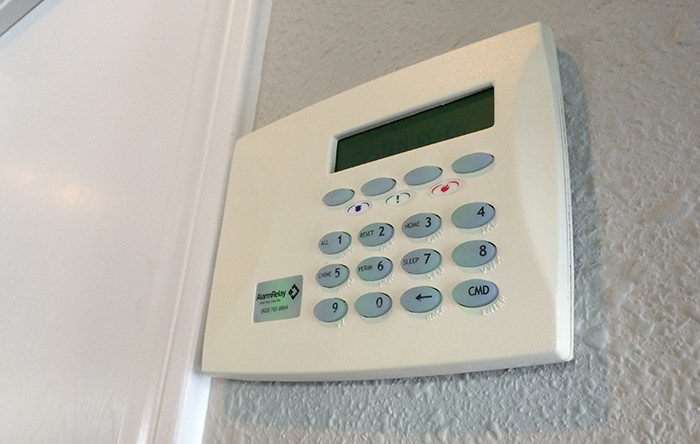Your home. Your castle. You should protect it, and the people inside.
But how?
If the concept of home security systems is new to you, it can feel overwhelming. But don’t worry: we can help. Just follow this easy-to-read primer on how to choose a home security system that fits your specific needs.
Types of Home Security Systems
Home “security” can run the gamut from a basic burglar alarm you buy on Amazon to robust home security systems that not only alert you when a break-in occurs, but also allow you to control things like thermostats and lighting (this is called “home automation,” which we’ll discuss in more detail below).
Repeat after us: the best home security system will depend on your home’s specific needs. Pricier systems or systems boasting tons of bells and whistles are not necessarily better. Again, it comes down to what your abode needs.
Home Security System Monitoring Options
The purpose of a home security system is to alert someone when there’s a problem—someone who can take immediate action.
Typically, home security systems alert a monitoring center, although you can get a basic system that alerts the homeowner only. The problem with only alerting the homeowner is this: what if the homeowner doesn’t receive the alert right away? Using a system with a monitoring center ensures that someone can respond promptly if a breach or other issue occurs (such as a fire).
Home security systems communicate with monitoring centers in one of three ways:
- Landline
- Cellular
- Broadband
A landline relies on a phone line for monitoring (but the system itself can be wireless), cellular relies on a cellular uplink, and broadband relies on a broadband Internet connection. Out of the three, cellular tends to be the most stable/fastest.
Home Security System Installation
You can choose from DIY options or security systems that require professional installation. The pros and cons to each are straightforward.
Do-it-yourself options tend to be simpler systems (i.e. these systems might not have as many features). They also tend to be cheaper. You own the equipment, and you can usually install everything in an hour or so (depending on the size of your home—larger homes might take longer). But if you make a mistake or you encounter a problem, troubleshooting could prove challenging.
Professionally installed systems, while pricier, also tend to offer more features. You can rest assured that everything works just as it should (and if a problem occurs, a capable technician can look into it). Plus, the technician can show you and your family members how to operate different features.
The Wonders of Home Automation
In the “old” days, security systems simply focused on detecting breaches to your property. As we mentioned above, many of today’s home security systems offer a menu of home automation options, including items such as:
- Temperature gauges
- Lighting controls
- Energy-saving controls
- Medical pendant alerts/monitoring
- Flood detection
- Video surveillance/CCTV
- Fire/carbon monoxide monitoring
The beauty of home automation is that you can control all these functions remotely from a smartphone, tablet, or any device that can access the Internet. So while you’re skiing in Aspen, for example, you can check the temperature of your home and make sure your pipes aren’t about to freeze. Or you can watch as your kids enter the house after school. Or if you’re going to be getting home late from work, you can make sure the lights are on in the house when you arrive. You get the idea.
How to Choose a Home Security System Based on Your Residence Type
If you rent an apartment or house, opting for a DIY wireless system is a smart option since you can take it with you wherever you move to next.
If you’re a homeowner, you could go either way: a DIY system or a more robust, professionally installed system that offers complete security and monitoring options (e.g. home automation). That said, wireless systems tend to be the best option, regardless.
An Educated Consumer is the Best Consumer – Questions to Ask
The devil is in the details, as they say. Here are questions to ask and other things to consider:
- How much does the home security system cost? Remember, pricier systems don’t necessarily mean “better” systems. Know your budget beforehand and stick to it. Make sure you understand any installation fees associated with the system.
- Do I need a landline? Any company or product that only operates using landlines is not the way to go in this digital age. Cellular and broadband are much better options.
- What happens if I move? If you’re in a situation that requires a lot of moving, it makes sense to opt for a plan where you own the equipment or that allows you to transfer your service and equipment free of charge. Read the contract details/clauses carefully.
- Can I access my system remotely? Given the world in which we live, it makes more and more sense to opt for a system that allows you remote access and mobile access (and this feature shouldn’t break the bank either; mobile apps for decent systems will likely be free or included with the basic package).
- What happens during a power outage? If possible, choose a system that provides an automatic backup.
- Are your employees trained/certified? See if the security company’s employees have received proper training (consult this tip sheet from the Electronic Safety Association for other things to look for in a qualified security company).
By the way, if you’re still wondering if a home security system is even necessary, here are 20 alarming burglary facts that will likely persuade you.
Photo By: Daniel Oines, July 27, 2015 via Flickr, Creative Commons Attribution.



